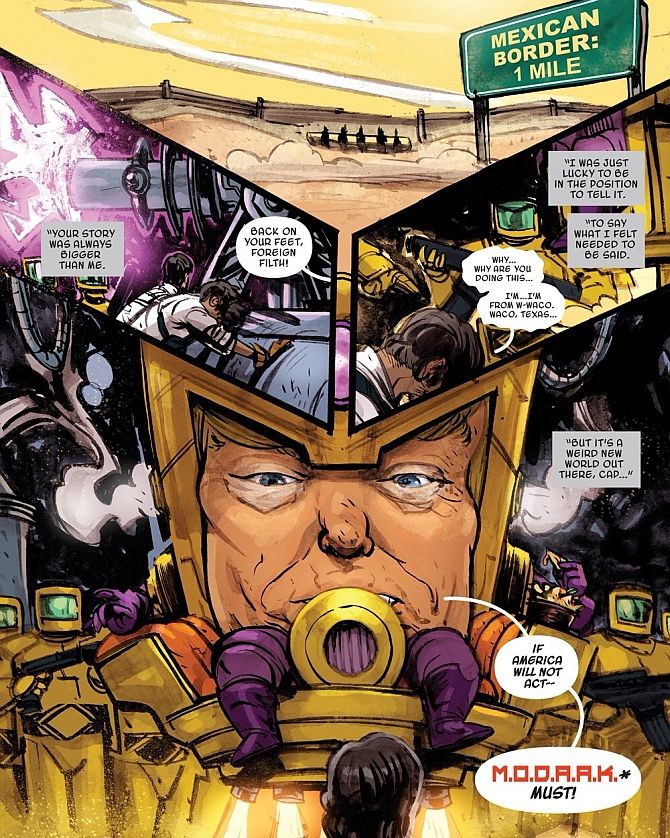'Can he be the statesman that a divided nation needs?'
'Not remotely, but by following his gut, he may yet surprise the scores upon scores of naysayers,' says Vikram Johri.

IMAGE: Marvel Comics turned Donald Trump into a comic book character in a Spider-Man spin-off. Kind courtesy: Marvel Comics
One of the hallmarks of the Trump presidency has been the near-constant sense of chaos it seems to reel under.
From the national security adviser to the press secretary, and most recently Rex Tillerson who was the secretary of state, close to 20 senior officials have either resigned or been fired by Trump since he took over the presidency a little over a year ago.
Combined with allegations of Russian meddling in the polls that brought him to the White House and his barrage of criticism against what he terms the 'fake news' media, the picture that emerges is one of an administration struggling not just to govern but survive.
Yet, Trump has also been consistent on the promises he made to the electorate, especially the vast swathes of the Midwest that elected him to power. One universally applauded policy measure is the rationalisation of the tax code.
Similarly, the trade war with China, notwithstanding what it may lead to, is meant to signal that he means business when he talks about reviving old industrial towns that have borne the brunt of globalisation.
How then does one read this administration? Is it falling apart, as the dominant media narrative would have us believe, or is it on course to fulfil the agenda it set itself, as Trump and his supporters would argue?
There are worse places to look for an answer than a new documentary on Trump, streaming on Netflix.
Titled Trump: An American Dream, the documentary was produced by Britain's Channel 4 after Trump unexpectedly won the presidency.
It charts four decades in the life of the businessman who first found success in the New York City real estate, building upon his father Fred Trump's legacy.
The documentary begins in the 1970s, a time of great social unrest in New York. Crime had peaked and a bankrupt administration had failed to provide even basic services.
One scene depicting archival footage has streets overflowing with garbage after the city's sanitation workers refused to go to work because they had not been paid their wages.
Trump, the documentary suggests, used this opportunity to return the city to its former glory by offering to refurbish the iconic Commodore Hotel.
Fred Trump had made his fortune in low-cost housing designed mainly for the city's poor. His son, however, looked to upscale and whatever he built, from the Trump Tower in NYC to the Taj Mahal casino in Atlantic City, had the stamp of glitz written all over it.
The documentary presents the story of Trump's rise in the construction business as a corollary of the man's remarkable ability to strike the best deal.
Not just for Commodore Hotel but even for the Trump Tower, which was marketed as a home for the super rich, Trump managed to extract mega tax breaks from the city with the plea that these 'projects generated employment and boosted the citys image.
This brought him in the crosshairs of the then mayor, Ed Koch, who had been elected in 1978 on a platform of honesty and corruption-free government.
Trump attacked Koch personally, using his media appearances to paint him as a Luddite who could not look to the future.
If it were not for the graininess of the footage, these scenes could have been plucked from his Presidential campaign.
They give us an early glimpse of the aggressive, hyperbolic personality that Trump has perfected over a lifetime.
Trump's focus on the big and the grand has not always succeeded.
The Taj Mahal, which according to some reports, was built for a billion dollars and opened in 1990, was unable to recoup the investment and was ultimately bought by the Hard Rock Hotels group after years of struggle.
Trump may not have lost his reckless streak, if more recent events are any indication.
The documentary also looks at his personal life, his first, 15-year-long marriage to Ivana Trump which broke down, it is suggested, when Ivana, who had always helped with the business, grew too ambitious and began stealing Trump's limelight.
His second marriage to Marla Maples lasted six years and he married Melania in 2005.
If the documentary tells us anything, it is that there is nothing truly remarkable about Trump's ascendancy.
Many have baldly speculated that he decided to run when Barack Obama poked fun at him at the 2011 White House correspondents dinner -- but this may well be true.
Trump comes across here as a creature of impulse, one who happens to possess the tenacity and gumption to convert that momentary throb into reality.
Battling Koch for that tax break, Trump told a reporter back in 1979, 'I'll wait for a more progressive administration and more importantly, I'll wait for bad times. When bad times come, then I'll get whatever I want.'
Nearly 40 years after he made that statement, Trump got his bad times, and then some.
He can be disgraceful, oh yes, but he is also incredibly lucky, and he now has a platform bigger than any dealmaking he has ever done.
Can he be the statesman that a divided nation needs? Not remotely, but by following his gut, he may yet surprise the scores upon scores of naysayers who are still wondering how America elected this man President.












 © 2025
© 2025